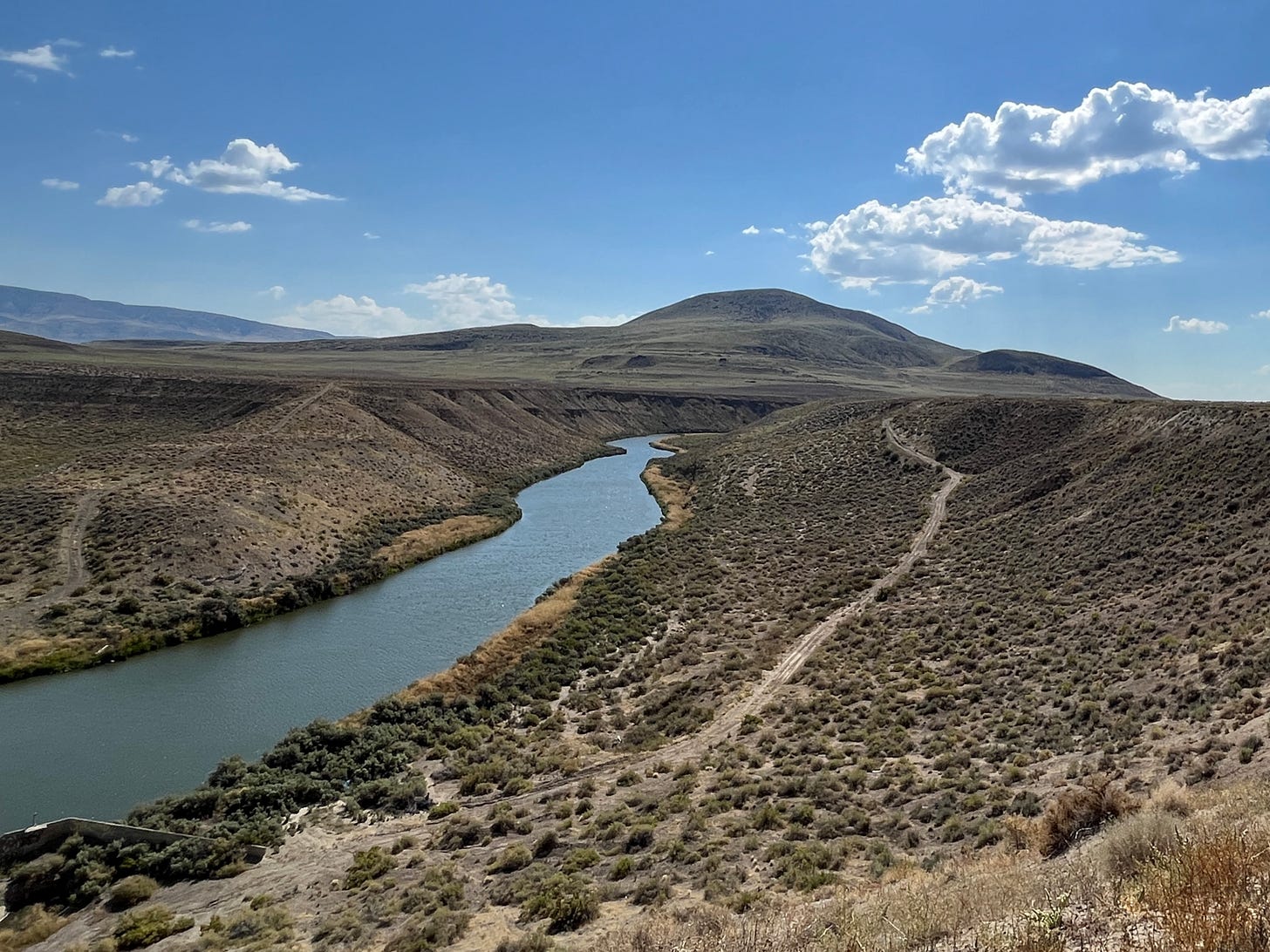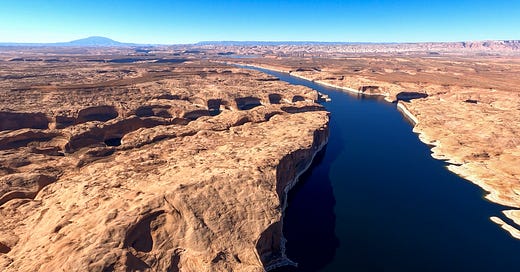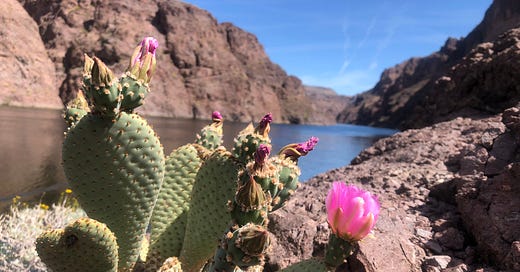
Hydro project could test tribal sovereignty rule
The Pyramid Lake Paiute Tribe is asking regulators to rescind a permit on tribal lands.
Hello, and welcome to Western Water Notes.
To get all my posts in your inbox, click the button to subscribe below. This newsletter is free, but if you find my work valuable and want to support it, please consider the monthly or yearly subscription plans below. You can also support my independent journalism by sharing these posts with friends or on social media. As always, drop me a line with feedback or suggestions.
-Daniel
The Pyramid Lake Paiute Tribe filed a formal motion earlier this month to intervene in a federal regulatory proceeding that could eventually pave the way for a pumped storage hydropower project on the tribe’s land — a project the tribe opposes.
The filing comes only weeks after the Federal Energy Regulatory Commission (FERC) ruled that it would deny permits for hydropower projects on tribal land in cases where projects do not have a tribe’s support.
This latest filing could test how that policy works.
In the case of the Pyramid Lake proposal, FERC signed off on a preliminary permit in October, months before issuing the policy. Even so, the tribe argued FERC should — especially in light of its new policy — cancel the permit based on its opposition.
Pyramid Lake sits at the terminus of the Truckee River, which rises above Lake Tahoe and flows through Reno. In the early 1900s, upstream diversions and the construction of the Newlands Project caused a nearly 100-foot decline at the lake, threatening two fish species: the cui-ui and Lahontan cutthroat trout.
Since then, tribal leaders have worked for decades to protect the fish and ensure water flows to Pyramid Lake. By withdrawing water from the lake, the hydropower project, the tribe argued, could undermine their ecosystem recovery efforts.
Pumped storage hydropower projects generate electricity by cycling water between two reservoirs at different elevations. They pump water from a low-elevation reservoir to a higher-elevation reservoir when there is excess energy available. When energy is needed, the water is released back to the lower reservoir and generates electricity as it flows down an elevation gradient and through a turbine — with the help of gravity.
In this way, the projects act as massive batteries on an electric grid in need of more storage to balance out intermittent wind and solar resources. But they can come with significant impacts for communities, especially in a region as dry as the Great Basin.
Here’s how the Pyramid Lake Paiute Tribe summarized its concerns in the filing:
“The project, if ultimately constructed, would be disastrous to the interests of the Tribe because pumping water from the Pyramid Lake, which is home to two species listed under the federal Endangered Species Act (Lahontan cutthroat trout and the cui-ui), to one or more reservoirs that would be constructed in the hills northeast of the Lake, and would require 14,000 acres of lands on the shore of the Pyramid Lake for construction of a 2,000 mega-watt photovoltaic solar farm, and several miles of new electrical transmission lines/towers to transmit the power produced by the Project to southern California, would severely adversely impact the Pyramid Lake Paiute Tribe’s federally-protected lands, water resources, water rights, fishers, economy, and other natural resources.”
Beyond those concerns, the tribe said it was not consulted on the permit before it was granted. Although the commission required the developer to notify multiple federal agencies (including the U.S. Bureau of Indian Affairs) of its plans, regulators did not require the developer to consult with the tribe, “despite FERC’s knowledge that the project is proposed to be constructed on the Tribe’s reservation.”
That alone would seem to violate the intent of the commission’s newly-adopted tribal sovereignty policy, a rule that came out of a case involving preliminary permits for multiple pumped storage hydropower projects on Navajo Nation land.
In the Navajo Nation case, the commission created a rule to deal with issues similar to the one facing the Pyramid Lake Paiute Tribe:
“…we are establishing a new policy that the Commission will not issue preliminary permits for projects proposing to use Tribal lands if the Tribe on whose lands the project is to be located opposed the permit. To avoid permit denials, potential applicants should work closely with Tribal stakeholders prior to filing applications to ensure that Tribes are fully informed about proposed projects on their lands and to determine whether they are willing to consider the project development.”
FERC declined to comment because the motion is pending. An executive with the developer, Premium Energy Holdings, did not respond to an emailed request for comment.
But the tribe’s concerns about the project were not new and were not unknown at the time that FERC approved the preliminary permit in October: In 2020, the Pyramid Lake Paiute Tribe had opposed an identical project proposed by the same developer, citing lack of consultation as one of its major concerns. FERC approved the project later that year.
Here are some other threads I’m watching:
There is a lot of political support for building California’s largest new reservoir in 50 years. Recent federal funding means the Sites Reservoir in the Sacramento Valley has secured about 90% of its financing, according to a story by Mercury News reporter Paul Rogers. But there remain environmental concerns about how the reservoir could affect Sacramento-San Joaquin River Delta:
“The make-or-break moment for Sites is a series of hearings scheduled to run from June to November in which the State Water Resources Control Board will analyze fisheries studies and other documents and decide whether to award it the water rights to move forward.”
“Two-thirds of the tribes with lands and water rights in the Colorado River Basin are calling for equal status in developing new river management guidelines and protection of their senior water rights against proposed cuts or caps on developing their water,” the Arizona Republic’s Debra Utacia Krol reports.
Another storm is headed this way, via the Reno Gazette Journal.
The L.A. Times’ Ian James on the removal of the Klamath River dams — just the start in restoring a river manipulated and impaired by the impoundments. “It feels like a cleansing that is long overdue,” a member of the Karuk Tribe said. “This river has been literally dying for years, having the life strangled out of it by these dams.”
Quite the opening to this story: “A Senate panel voted to shut the public out of the key business of the state agency tasked with finding new water for Arizona.” Capitol Media Services’ Howard Fischer writes about how Arizona’s Water Infrastructure Financing Authority could be exempt from the state’s public records laws.
















I've attended events on social license at Colorado School of Mines and "lack of consultation" or late stage 'consultation' was pointed out as a cardinal sin for extractive industries like mining. Why are authorities repeating known mistakes?